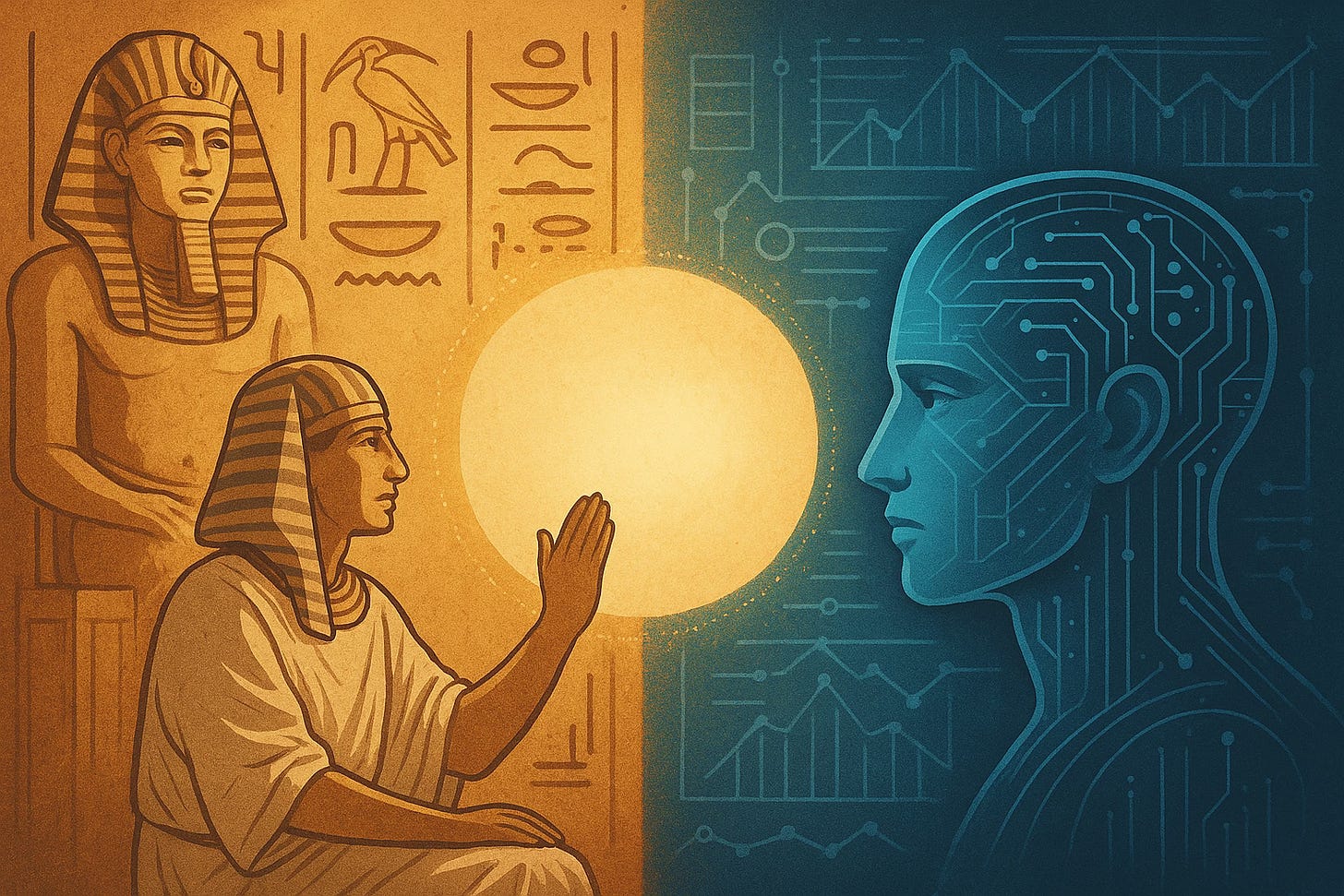The Pharaoh's Prophecy and the future's many paths...
The future was never set in stone for the Ancient Egyptians, it was a shifting landscape guided by divination. How can we draw parallels to the modern world and what does divination mean to us today?
Prophecy in modern perspectives
The modern world is letting AI make decisions for their futures; taking on a forecasting role but in place of divine insights it’s algorithms and data sets. This shift from mystical insight to mathematical insight highlights our human desire to predict the future and try to predict life's big questions.
Egyptians relied on priests, omens and cosmic signs to predict and pave the way for their futures; letting signs be the spark for creation.
These prophecies influenced politics and personal lives. Egyptians hieroglyphic inscriptions also played a huge role and were a large form of insight, also becoming a forecasting tool for the techniques they wanted to use to build the pyramids.
The Egyptians had a lot of faith in divination…
Isabelle Rose, an Ancient Egyptian fanatic with a deep interest in divination, has shared her perspective. ‘Egyptians had a hybrid view, the gods had a big hand in shaping destiny, but people weren't totally powerless; they could still make choices to influence their fate and that's not too different to how we think about things today.’ This gives us a lot to think about, do we want to let divine forces or technology tell us where our futures are going or do we want to determine our own fate.
The Egyptians relied heavily on their prophecy but it didn't always go to plan. The prophecy Ezekiel 29, claimed that Egypt would scatter among foreign countries however this prophecy famously failed. Put this into modern context, would you want AI to start predicting what is going to happen to different countries ? Would you rely on this? The binary algorithms on modern technology work in intricate ways, but is it divination or is it trust in mathematics?
The desire to predict and shape the future
Humans have an unwavering need for control. There is a self fulfilling need to know what's coming and to keep everything under control. People want predictions for security or financial purposes or perhaps for health decisions. You can ask AI to tell you these things but we can't guarantee accuracy. Future predictions and the effects are fundamentally subjective, whilst one person may think that it is incorrect and choose to ignore it, another individual may shape their life around it and act differently to fulfil the predictions. This can be compared to Isabelle’s viewpoint that ‘in ancient oracles if someone heard a prophecy that they would become king they might start acting like it or make choices to push them in that direction’ this is a enlightening perspective that allows us to think about the effects of predictions and how we can allow numbers and patterns to determine our journeys. Whilst we allow science estimate aspects of our lives with a small module of error, can mathematics and AI data sets have the same reliability.
AI’s prominent role in shaping the future
AI works by analysing large datasets, identifies patterns and forecasts based on existing information. Real life applications of AI vary from predicting disease outbreaks or how financial markets will rely on AI driven algorithms. AI has also been used to predict climate patterns or weather risks. As the ever evolving landscape of modern technology looms large we get lost in what humans can do and what we can then ask technology to do. In some cases governments and corporations depend on AI, just as ancient rulers once relied on oracles. Isabelle drew a similar link between AI and oracles; ‘they are doing the same thing, just different tools, they relied on astrology and dreams while AI is all about crunching the data and spotting patterns but at the core they're both trying to get a glimpse of what's ahead. For anthropological and philosophically inclined thinkers this poses us with an interesting question prompted by Isabelle: “is AI a high tech version of divination?”
The Intersection of ancient prophecy and modern AI
There is a clear shared purpose between AI and prophecy; that this is a tool to help humans navigate uncertainty and in an attempt to bridge the past with present the methods have noticeably changed but the fundamentals remain the same. Humans still equally rely on guidance with their futuresnow then we did in the past. That being said, AI has really started to grow in it;s everyday usage, which Isabelle touches on ‘ we use it in everyday life whether it's what to watch or who to date the more it starts to feel like we're following a script’. For those more prone to theorise our daily habits this leaves us wondering if it is getting out of hand ,are we going to lose jurisdiction for personal decision making.
The future of AI and its role in shaping the future
When living in a world with ever growing technological advancements rightfully there are concerns for ethics being tampered with. However, there is no way to stop the advancements of the modern world. Albeit a newly improved modern world we live in, there are two sides to the coin and uncertainty must also be embraced, unpredictability will always exist. In a world where technology is slowly overshadowing philosophy, anthropology and ethical studies it is necessary to reflect on the nature of uncertainty in life. Even as AI becomes increasingly adept at forecasting, life is unpredictable, just like Egyptians acknowledge forces beyond their control. With role of AI moving forward it is natural to speculate on the continued prominence of AI in the future
In light of philosophy and life’s big questions, coming to a conclusion isn’t always the best way, instead leaving you with more questions and embracing our inherent sense to want to know more.





